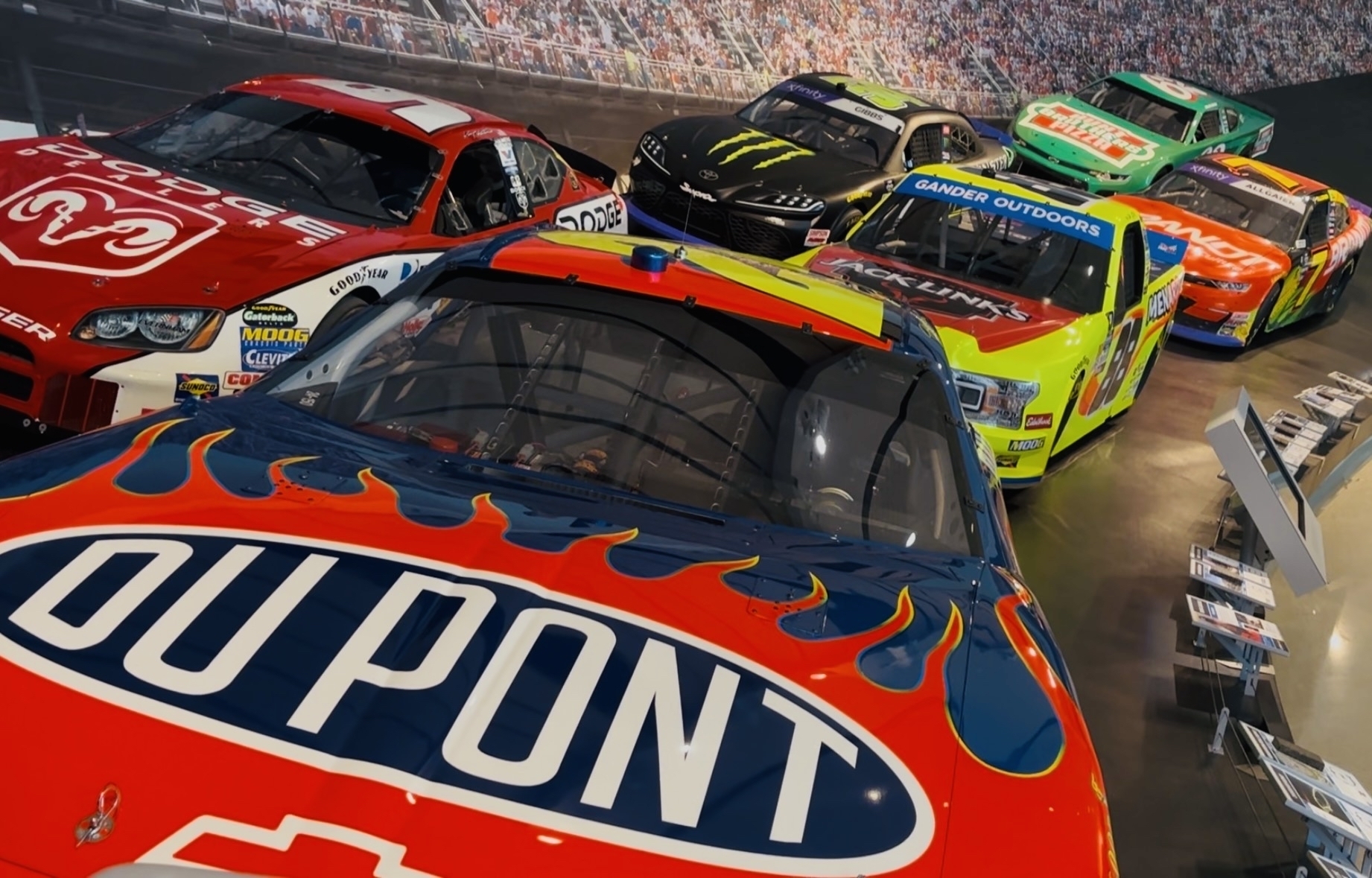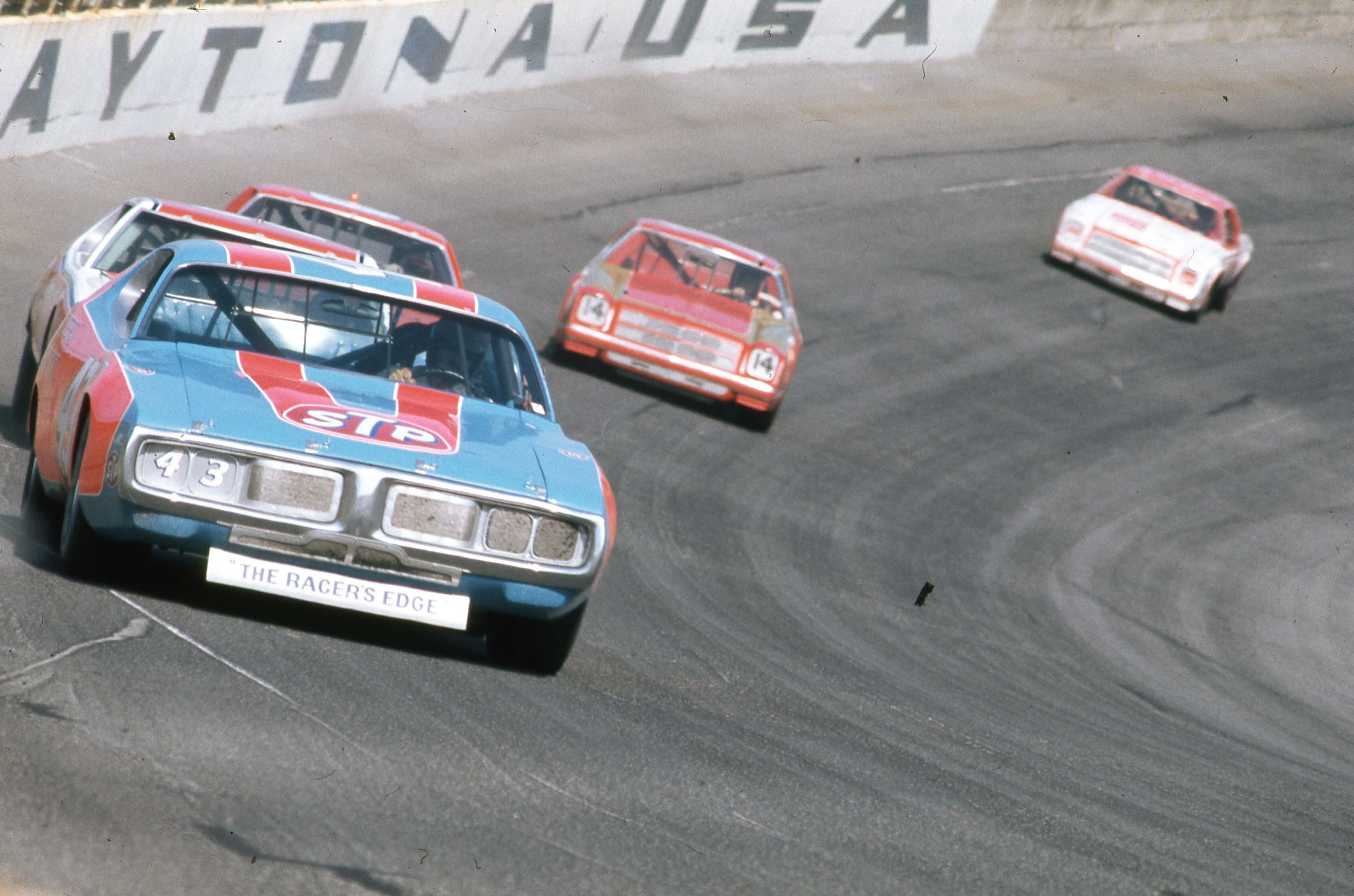Q&A with "The King" Richard Petty: 7-Time NASCAR Cup Series Champion
by Tom Jensen June 10, 2020
“The King” was NASCAR’s biggest winner and remains one of the sport’s greatest ambassadors.

Throughout his long career, Richard Petty has always gone out of his way for race fans. Photo courtesy of NASCAR Archives & Research Center via Getty Images.
Throughout its long and rich history, NASCAR has produced many stars, superstars and legends. But only one NASCAR hero is universally recognized by his two-word nickname.
That would be “The King” aka Richard Petty. He’s a member of the inaugural NASCAR Hall of Fame class of 2010, the all-time leader in premier series race wins with 200 and one of the sport’s three seven-time champions.
At 82 years old, Petty is still going strong, a fixture in his trademark Charlie One Horse cowboy hat, dark sunglasses and ever-incandescent smile.
We caught up with The King by telephone for an exclusive interview about the NASCAR Hall of Fame and what it’s meant to Petty, his family and the racing community at large.
Tom Jensen: What did it mean to you to be inducted into the first class of the NASCAR Hall of Fame?
Petty: (Laughs) I’ve just been here longer than everybody else. No, it was a really big deal. I looked at it a little bit different, I guess, then maybe a lot of other people. I thought the Hall of Fame deal to begin with ought to have been the people who really got NASCAR started, you know what I mean?
Junior (Johnson, 2010) was almost there, but my dad (Lee Petty, 2011) should have been in the first deal, Fireball (Roberts, 2014), the people who got NASCAR started, okay? And I looked at it from that standpoint.
But then I saw when they put me and Dale (Earnhardt, 2010) and Junior and the France guys (William H.G. France, 2010, and William C. France Jr., 2010), I said, “OK, we’ve all been here for a pretty good while. And that group was the leaders when they came through.”
And it might be all right to start it. Plus, being a new Hall of Fame, they had to have a couple of warm bodies to put it out there. I figured that’s where Junior and I came in.

The first career NASCAR win for Richard Petty came in 1959 in a Convertible Division race at Columbia, South Carolina. Photo courtesy of NASCAR Archives & Research Center via Getty Images.
Not only did you go into the Hall of Fame, but your father, your brother (Maurice Petty, 2014) and your cousin (Dale Inman, 2012) also were inductees. What did that mean to your family?
It was great. You think about it: I wouldn’t have been in without my dad. My dad might not have been in without me and my brother, and Dale was there all of the time on all of that, too.
If you look back and you look at other halls of fame, we’re probably the only people in the world that’s got the whole team in the Hall of Fame.
You think about it, I wouldn’t have been in without my dad.
— Richard Petty
Families are a huge part of the Hall of Fame and the sport as a whole, right?
You look at it as a family sport, because it’s a small sport compared to football, baseball, basketball. There’s only so many participants in it. In a given year, there might be 50 different drivers or so. On a regular basis, there’s 35 or 40 of us playing. So, we’re working with a small group of people. We don’t have that many heroes or that many Hall of Fame people, because there’s not that many people.

Caption: Richard Petty’s first of 200 NASCAR premier race wins came in 1960. Photo courtesy of NASCAR Archives & Research Center via Getty Images.
You look at it as a family sport, because it’s a small sport compared to football, baseball, basketball. There’s only so many participants in it.
— Richard Petty

In 1964, Richard Petty won his first of seven Daytona 500s and his first of seven NASCAR championships. Photo courtesy of NASCAR Archives & Research Center via Getty Images.
What makes somebody a Hall of Famer?
I guess I never really thought about it that much, but just off the cuff, it’s got to be somebody that sort of shook the rafters when they came through. Maybe not 10 or 15 years, but one or two years – people that kind of, in certain circumstances, rise above all the other competitors they’re dealing with at that particular time.
All of us came through at different stages, and we competed against different people, so you have, say, a David Pearson (2011). He came along with me and Buddy (Baker 2020), Junior, a bunch of ‘em. He had some outstanding years – three or four, or whatever – that automatically puts him in, because he stood out at a certain time.

The checkered flag flies for Richard Petty in the 1966 Daytona 500. Photo courtesy of NASCAR Archives & Research Center via Getty Images.
Do you and other drivers still talk about the old days when you’re together?
Not really. Probably the only time we see each other is at the Hall of Fame. As everybody gets away from racing, they go out – Cale (Yarborough, 2012) is doing his own thing and he’s not very social when it comes to doing this stuff. Darrell (Waltrip, 2012) is always there. We lost Junior and Pearson.
A lot of guys you just see once a year. It’s like an old homecoming that you have at the church every year. People just come back and you don’t see them for another year.

In 1967, Richard Petty won a record 27 races, including 10 in a row. Photo courtesy of NASCAR Archives & Research Center via Getty Images.
What do you remember from the first induction night?
I didn’t know what to do and how to act, who to thank. It was so new that I had nothing to fall on. You thank your family, you thank the people that got you to where you were at. Because without them, you wouldn’t be up there. It was just another one of those deals where you happened to be the first speaker, so how do you do it and what do you do?

The fourth of Richard Petty’s seven Daytona 500 victories came in 1973. Photo courtesy of NASCAR Archives & Research Center via Getty Images.
How important is it for NASCAR fans to have a Hall of Fame?
Anything that’s going on now, you need the history, okay? For people to really enjoy and think about what’s going on today, what did it take to get that far? In any sport or any business, how did it start? Who started it? Who were the ones who kind of led the field to get it to be a nationwide sport?
And I think a lot of people are really interested in it. They hear these names and they read about David doing something or Cale doing something or Junior doing something. Who was that? They don’t know those people. So, when they go to the Hall of Fame, they can get a brief history on where these people came from, what they’ve done and what they contributed to NASCAR racing.

Richard Petty earned his seventh and final premier series championship in 1973. Photo courtesy of NASCAR Archives & Research Center via Getty Images.
Why did you make a point early in your career to be so involved with race fans?
At the time when I started running and my dad was running, there was no sponsorship, okay? All of the money came out of the racing purse. For some reason, it registered on me that the fan was the sponsor for me. If the guy didn’t come to the grandstand to buy that ticket, then the promoter couldn’t pay me and then I couldn’t take my money, give it to my wife and let her take care of the household things.
So, the first thing you know, “Thank you for coming to the race and helping me make a living.” And so it just came easy, because really, if you look back, we’d run these races and maybe 4,000 or 5,000 people were in the grandstands, sometimes less than that, sometimes more.
Things weren’t as hectic then. People didn’t scurry around, didn’t have the Internet and (cell) phones. People are so busy now they don’t have time to pay attention to a lot of stuff. Things were a little bit slower. You took your time. You didn’t race around.
It worked out good for me, because in the shop, I’d work on the race car, drive with the boys to take it to the race track. A lot of times, I’d get out and help them unload, all that stuff. But when the race was over, how could I kill time if I didn’t have to help them load up the truck? (laughs) I didn’t mind sitting on a pole somewhere and sign autographs. And then when they got the truck loaded and all ready to go, they’d come and get me and go home. Simple.

More than 60 years after his first race, Richard Petty remains one of the most recognizable people in NASCAR. Photo courtesy of NASCAR Archives & Research Center via Getty Images.
How important is it for you to have your cars on Glory Road and represented in the NASCAR Hall of Fame?
It makes me feel good if Daddy’s car is there or one of my cars, because, again, it goes back to the history of how everybody got there. Why there’s a Hall of Fame, why these people are in it. The basic deal is if you’re represented when the people walk in the door or whatever, that makes you feel good from the standpoint.

Richard Petty was inducted into the first NASCAR Hall of Fame Class of 2010. Photo courtesy of NASCAR Archives & Research Center via Getty Images.
Why is the Hall of Fame important for race fans?
I just think for a real race fan, even for the people who don’t know much about racing or about NASCAR, they need to go to the Hall of Fame, just to see where NASCAR came from. Richard Petty or David Pearson or Jimmie Johnson – why are they there? You go to the Hall of Fame and it puts everything together for everybody.
Plan your visit to the NASCAR Hall of Fame and purchase tickets by visiting nascarhall.com/tickets.














